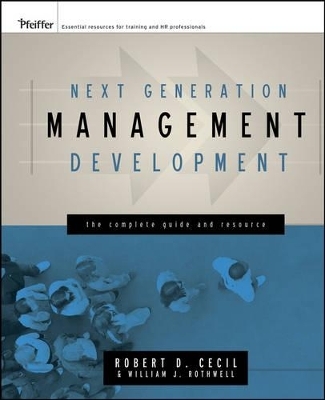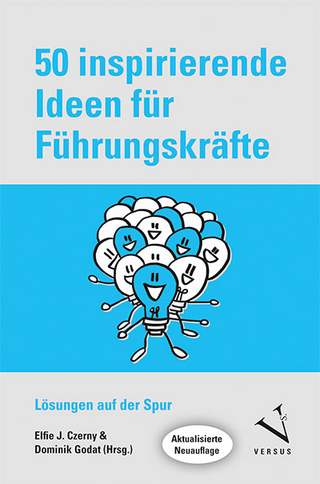
Next Generation Management Development
Jossey-Bass Inc.,U.S.
978-0-7879-8271-3 (ISBN)
- Titel ist leider vergriffen;
keine Neuauflage - Artikel merken
This innovative, comprehensive, and fully integrated management development program provides a vehicle for enabling managers and leaders to participate more effectively in their organization's OD processes. The concepts, models, tools, and other materials have been used successfully to train managers, leaders, and MD/OD personnel in organizations such as IBM, AT&T, Kraft, Baxter Labs, Sears, Caterpiller, and the U.S. Navy, Army, and Air Force. The accompanying CD-ROM contains customizable tools for OD consultants and facilitators as well as additional chapter material.
Robert D. Cecil is the chairman and president of R.D. Cecil and Company. William J. Rothwell is a professor of workplace learning and performance in the Department of Learning and Performance at the University Park Campus of the Pennsylvania State University.
Figures and Tables. CD-ROM Contents. About the Authors. Introduction. Unfulfilled Needs of Organizations. Basic Description of the Book and Its Purposes. Benefits of This Book for Professional and Student Audiences. How All Readers Can Get the Most from This Book and Its CD-ROM. 1 Preview of the Book's Next Generation MD/OD Project. Introduction. Description of an Integrated MD/OD Project. Recommendations on Designing a Highly Effective MD/OD Project. Concluding Remarks. PART ONE: MANAGEMENT (INTEGRATIVE) FUNCTIONS AND PROCESSES. 2 Initial Perspectives on Management Functions and Processes. Introduction. The Basics. The Think-Work Functions. The Implementation Functions. Beyond the Basics. Fresh Perspectives on the Managerial (Integrative) Process. Additional Perspectives on Management and Management Processes. Basic Obstacles to Effective Think-Work. Concluding Remarks. 3 The Analysis Phase. Introduction. The Basics. Definitions. Basic Analytic Steps. Four Major Reasons for Thoroughly Analyzing a Situation. Basic Rules for Effectively Analyzing a Situation. Beyond the Basics. Human Limitations and How to Compensate for Them. Analytic and Knowledge Management Tools. Concluding Remarks. 4 Planning Phase Functions. Introduction. The Planning Phase in General. Goal Setting. Planning. Budgeting. Concluding Remarks. 5 Decision Making. Introduction. The Basics. Definition. Purposes and Benefits of a Decision-Making Process. Description of the Decision-Making Process. Basic Types of Decision-Making Situations. Types of Decision-Making Situations Based on the Number of Alternatives That Can Be Chosen. Beyond the Basics. Visualization Tools for Better Decision Making. Basic Phenomena That Underlie Ineffective Decision Making. Common Pitfalls and How to Address Them. Concluding Remarks. 6 Implementation Functions of Management. Introduction. Organizing. Staffing. Guiding Planned Activities. Controlling. Concluding Remarks. 7 Managing Time. Introduction. The Basics on Wasted Time. Symptoms of Wasting Time (Ring D). Cycle-Perpetuating Results: Emotional and Physical Stress (Ring E). Ways That Many People Waste Time (Ring C). Beyond the Basics. Major Causes of Wasted Time (Ring B). The Real, Underlying Causes of Wasted Time (Ring A). The Analytic Approach to Managing Time. Concluding Remarks. Recommendations for Conducting the Superior-Subordinates Discussion, OD Application, and Team-Building Sessions Following the Training Portion of Module 1. PART TWO: INDIVIDUAL, ORGANIZATIONAL, AND MANAGERIAL BEHAVIOR AND DEVELOPMENT. 8 Managerial and Leadership Styles. Introduction. The Basics of Motivation. Maslow's Hierarchy of Needs. Herzberg's Hygiene (Maintenance) and Motivator Factors. Factors' Effectiveness. Basic Frameworks for Understanding Managerial and Leadership Styles. McGregor's Theory X and Theory Y Styles. Three Additional Managerial Styles. Tannnenbaum and Schmidt's Continuum of Management Styles. Likert's Four Management Systems. The Ohio State Studies' Grid Framework. Blake and Mouton's Grid Concept. Miles's Human Resources Approach to Management. Situational (Contingency) Theories. Ouchi's Theory Z. Concluding Remarks. 9 Major Nonpersonal Influences on Managerial Behavior. Introduction. The Socio-Technical Context. Task-Related or Technological Variables. Organizational Factors. Social Factors. External Forces and Factors. Subordinates' Individual Characteristics and Behavior. Concluding Remarks. 10 Personal Influences on Managerial Behavior. Introduction. Concepts Underlying The Managerial Target. The Managerial Target. High Task, Low People (HT,LP), Theory X, Authoritarian, or 9,1 Tendencies. High Task, High People (HT,HP), Theory Y, Participative, Team, or 9,9 Tendencies. Determining What The Managerial Target Indicates About an Individual's Overall Level of Managerial or Leadership Effectiveness. Perspectives on the Usefulness of The Managerial Target. Concluding Remarks. 11 Unifying "One Best Style" and Contingency or Situational Theories. Introduction. Summary of the Case for One Best Style. Situationalism. Two Tracks to One: Combining Both Theories into a Single, Synthesized Perspective. The Developmental and Participative Aspects of a High Task, High People Approach. Concluding Remarks. 12 Summary of Socio-Technical Influences and the Implications for a Synergistic MD/OD Project. Introduction. Additional Contexts for Organization Development. Review of MD/OD Program Phases in Terms of Three Major Illustrations. Review of Basic Educational Considerations in Designing an Integrated MD/OD Program. Two Socio-Technical Considerations in Designing an Integrated MD/OD Program. Concluding Remarks. Recommendations for Conducting the Superior-Subordinates Discussion, OD Application, and Team-Building Sessions Following the Training Portion of Module 2. PART THREE: INDIVIDUAL PROBLEM SOLVING AND DECISION MAKING. 13 Improving Individual Problem Solving and Decision Making. Introduction. The Basics. Types of Problem-Solving Situations. Approaches to Problem Solving That Are Less Effective Than the Analytic Approach. Phases and Steps of the Analytic Approach. Beyond the Basics. Problem-Solving Styles and Orientations. Factor-Related Ways to Improve Problem-Solving Effectiveness. Concluding Remarks. Recommendations for Conducting Superior-Subordinates Discussion, OD Application, and Team-Building Sessions Following the Training Portion of Module 3. PART FOUR: INTERPERSONAL RELATIONS AND SKILLS. 14 Perspectives on Interpersonal Relations. Introduction. Basic Personal Characteristics That Influence or Relate to Interpersonal Behavior. The Initiation, Development, and Maintenance Phases of Relationships. Interpersonal Styles on The Interpersonal Target. Behavior in Social Groups. Interpersonal Conflicts: Symptoms, Types, Sources, and Resolution. Concluding Remarks. 15 Effective Communication. Introduction. The Basics. Definition and Objectives, and Modes of Communication. Basic Sender and Receiver Inputs to the Communication Process. Nonpersonal Socio-Technical Influences on the Communication Process. Basic Symptoms of Faulty Communication. Senders' and Receivers' Responsibilities for Effective and Ineffective Communication. Beyond the Basics. Communication Styles. Phases and Steps of an Analytic Approach to Communication. Advance and Ongoing Activities for Continually Improving Communication Processes. Concluding Remarks. Recommendations for Conducting Superior-Subordinates Discussion, OD Application, and Team-Building Sessions Following the Training Portion of Module 4. PART FIVE: TEAM THINK-WORK IN ORGANIZATIONS. 16 Guiding and Participating in Team Think-Work Processes. Introduction. The Basics. Definitions. Advantages of Individual Think-Work Processes (Disadvantages of Group Processes). Advantages of Group Think-Work Processes (Disadvantages of Individual Processes). Major Issues: Quality Versus Acceptance. Conclusions About Individual and Group Think-Work Processes. Symptoms of Faulty Team-Think Processes. Beyond the Basics. Managers' Team-Think Styles. Advance and Ongoing Activities for Continually Improving Team Think-Work Effectiveness. Concluding Remarks. Recommendations for Conducting Superior-Subordinates Discussion, OD Application, and Team-Building Sessions Following the Training Portion of Module 5 390 PART SIX: LEARNING AND OTHER MANAGERIAL AND PERSONAL SKILLS. 17 Better Individual and Organizational Learning. Introduction. The Basics. Factors That Influence Learning. Modes of Learning. Methods of Learning. Phases, Steps, and Practices of a Structured Analytic Approach to Learning. Skill Development. Beyond the Basics. Learning Styles and Orientations. The Planning Aspects of Learning. The Learning Organization and Systems Thinking. Action Learning. Appreciative Inquiry. Reservations and Recommendations. Concluding Remarks. Recommendations for Conducting Superior-Subordinates Discussion, OD Application, and Team-Building Sessions Following the Training Portion of Module 6. PART SEVEN: SUMMARY AND SYNTHESIS OF CONCEPTS, PROCESSES, MODELS, AND PRACTICES. 18 The Unified Practice of Management Model and Its Implications for Developing More Effective Organizations. Introduction. The Unified Practice of Management Model: Integrated Processes and Models. The Unified Practice of Management Model: Management Gurus. Concluding Remarks. Recommendations for Conducting Superior-Subordinates Discussion, OD Application, and Team-Building Sessions Following the Training Portion of Module7 Appendix: Basic Descriptions of Major Management Gurus' Concepts. References. Index. How to Use the CD-ROM.
| Erscheint lt. Verlag | 9.1.2007 |
|---|---|
| Verlagsort | New York |
| Sprache | englisch |
| Maße | 210 x 252 mm |
| Gewicht | 1440 g |
| Einbandart | gebunden |
| Themenwelt | Wirtschaft ► Betriebswirtschaft / Management ► Personalwesen |
| ISBN-10 | 0-7879-8271-7 / 0787982717 |
| ISBN-13 | 978-0-7879-8271-3 / 9780787982713 |
| Zustand | Neuware |
| Haben Sie eine Frage zum Produkt? |
aus dem Bereich


